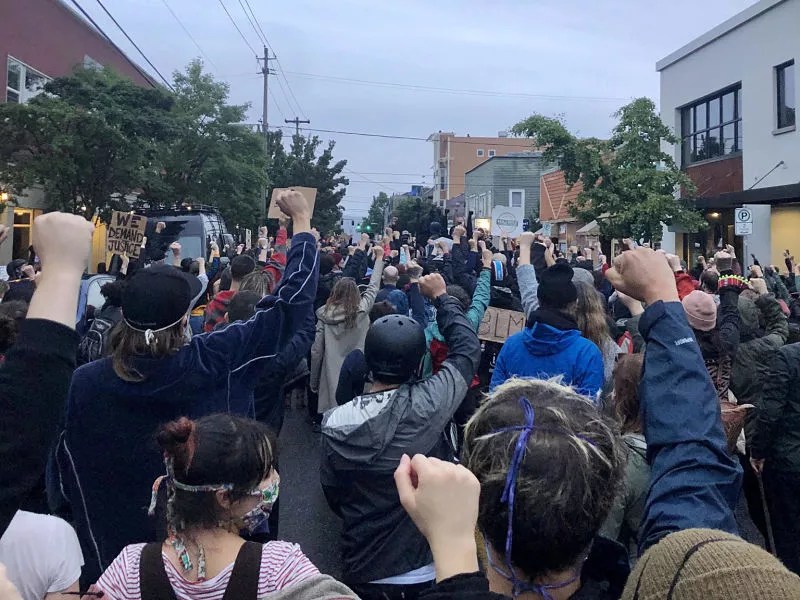
Sophie Caesar

Audio By Carbonatix
Marching in the protests last summer, I felt furious. Furious that police officers were murdering innocent Black bodies. Furious that those in power were denying any fault of their own. Furious that a system meant to ensure safety was perpetuating danger. With friends by my side, I joined in the chants of “All cops are bastards.” After all, they were the ones killing blameless citizens. How could every single one of them not be perpetuating violence?
I was wrong. It’s not that simple. The issue with police brutality in the United States is not the individual officers; it is the culture that develops when men with power are not taught how to regulate their use of force.
Police units value their vocational identity over any other characteristic, such as ethnicity, class or religion. Jennifer Cobbina in the book Hands Up Don’t Shoot tells how one police officer states, “It’s not a Black or White thing, it’s a blue thing.” The erasure of these differing narratives theoretically allows for complete cohesion. By acknowledging one piece of officers’ multidimensional identities, however, significant aspects of lives are ignored. Pretending that all officers have the same perspective or story eliminates their abilities to relate to and address average people. These intense feelings of camaraderie may appear to unite police forces, but they actually deteriorate them.
The ACAB rhetoric further distances police units from the public. In his article “A Sketch of the Policeman’s Working Personality,” Jerome Skolnick articulates that by “receiving hostility from the public, they are also drawn together and become dependent upon one another.” This attack on the officers does nothing to change their behaviors; it demonizes a group already socially distinct. Separating officers from the public will allow ignorance to continue, leading to violence against people of color.
Numerous studies have demonstrated the impact of the police agencies and units in determining police actions. In their article “Police Culture and Officer Behavior,” Ingram, Terrill and Paoline find that patrol group culture determines use-of-force and complaint behaviors. Officers who work in environments that subscribe to a culture of aggressive patrol practices and punitive management perceptions behaved similarly while on the job. This refutes the idea that ACAB, in that certain groups of police officers enact fewer acts of violence than others.
When comparing social identities to police groupings to violence, environment pervades over personal opinions and attitudes. Organizational police culture is strong, as Gary Cordner found in his Eastern Kentucky University study: “Officers’ perspectives do not vary greatly by officer personal characteristics but differ more substantially across police agencies. This suggests that police culture is to a significant extent an organizational phenomenon, not an occupational one.” Not every officer has violent tendencies; rather, certain agencies do. Police brutality is a contextual, rather than personal, issue.
The fact that use of force and attitudes stem from police unit culture is encouraging, in that there is potential for reform. Rather than every officer carrying malintent, certain agencies develop more violent social norms than others. These can be addressed and changed, as was seen in a study in Finland. Anderson and Gustafsberg found that a training method on use of force improved correct use of force decisions and overall performance: “The intervention group displayed significantly better physiological control, situational awareness, and overall performance, and make a greater number of correct use of force decisions than officers in the control group.” By focusing on police force guidelines, police brutality can be mitigated.
To be sure, the police force in the United States was founded in racism. Managing escaped slaves across state lines set standards for officers across the nation. In their split-second decisions, police officers have revealed the systemic racism set in many institutions. This culture of White supremacy cannot be overturned in one action. Small pieces, however, such as mandating trainings at the state level, work to address larger issues. Cooperation can occur instead of dismissal, restructuring the culture of agencies in differing regions. In addition, many states may not comply with such federal demands. States’ rights are a founding feature of our democracy. This does not minimize the impacts that state polices could kickstart, particularly for communities with high populations of Black people. Even one life saved can prove influential for both police officers and people of color.
I have yelled in the streets demanding change. I have experienced the agency that comes from protesting against inappropriate actions. I have been allured by the provocative messaging of ACAB. These ideas, however, will not change systemic police practices. Police agencies need to implement use-of-force trainings. They have the potential to address the greater biases present in our society, setting the standard for many other flawed institutions. They can help save lives and legitimize the police as a social institution.
The public also must stop chants of “All cops are bastards.” Distancing from the police is the opposite of what our society needs. Understanding and reform are attainable and consequential goals. The police can be a symbol of reconciliation and change instead of murder.
Sophia Caesar is a senior undergraduate student at the University of Denver, studying both sociology and socio-legal studies; she currently works as a teaching assistant for the DU sociology department. Her most recent class focusing on policing and society has broadened her perspective regarding the potential for police in the United States.
Westword publishes op-eds and essays on issues of interest to the Denver community every weekend. Have one you’d like to submit? Send it to editorial@westword.com, where you can also comment on this piece.